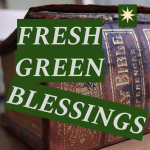
John 3:16 (KJV): For God so loved the world, that he gave his only begotten Son, that whosoever believeth in him should not perish, but have everlasting life.
∞∞∞∞∞∞∞∞
Most Christians are familiar with the phrase “only begotten son” to describe Jesus. In the King James Version of the Bible, this phrase is found four times in the Gospel according to John (John 1:14; 1:18; 3:16; 3:18), but this phrase is not found in the other three gospels. Similarly, in the translation of the New Revised Standard Version (NRSV), John is the one Gospel where Jesus is referred to as G-d’s only son. Matthew, Mark, and Luke all reference Jesus as a son of G-d, but these other three gospels (known collectively as the synoptic gospels for their similarities to each other and because of their differences with John) never say that Jesus is the only son of G-d. In fact, Matthew especially emphasizes that we are all sons and daughters of G-d.
The most famous prayer in Christianity begins “Our Father which art in heaven…” The “Our Father” prayer is only found in Matthew’s Sermon on the Mount. When talking with others, the Matthean Jesus tells the people that G-d is “your father” fifteen times (Matthew 5:16; 5:45; 6:1; 6:4; 6:6a; 6:6b; 6:8; 6:15; 6:18a; 6:18b; 7:11; 10:20 10:27; 18:14; 23:9). John uses the “your father” phrase only twice (8:42; 20:17) as a descriptor of G-d, and one of those two times, he is using it to show that others are not the children of G-d. John 8:42 & 44 reads, Jesus said to them, “If God were your Father, you would love me, for I came from God and now I am here…You are from your father the devil. This is a very different usage of the phrase “your father” when compared to the words of Matthew’s Jesus in the Sermon on the Mount, “But whenever you pray, go into your room and shut the door and pray to your Father who is in secret; and your Father who sees in secret will reward you” (Matthew 6:6). It should be no surprise that the Johnanine Jesus would not suggest a prayer that begins, “Our Father which art in heaven…” because from John’s theological viewpoint, only Jesus is the son of G-d.
The point here is not to elevate one understanding of Jesus over another; the point is to awaken those of us who love Jesus and his teachings to the reality that – from very early on – different people understood Jesus quite differently. Councils and theologians have worked hard to meld and conflate these differing understandings into a unified whole and you may wish to do the same, but we risk losing much of the depth and breadth of Christianity in the process.
Just as there are many schools of Buddhism, we may attempt to discern what some of the early schools of Christianity were – and how they differed. As a beginning point, a careful study of different gospels will show you that different early Christian groups held not marginally different understandings of Jesus – instead, they held radically differing theological perspectives on both who Jesus was and what the primary message was of Jesus’ life and teachings. What might be gained by recognizing, exploring, reaffirming, and celebrating the rich diversity of meanings that Christianity has offered its advocates for two thousand years?
∞∞∞∞∞∞∞∞
Before trying these activities, try to let go of your understanding of Jesus – try to read the Bible with completely fresh eyes, as if you’ve never heard of this fellow named Jesus.
Choose one of the three synoptic gospels (Matthew, Mark, or Luke) and study it, read it deeply from beginning to end. What is the gospel writer trying to convey about Jesus and the importance of his life and teachings?
Then, read John’s Gospel – studying it, reading it deeply from beginning to end. How does it compare with the message from the synoptic gospel that you read? How is it similar? Where is it different?
(Music: Courtesy of Adrian Von Ziegler, “Circle of Life.” )